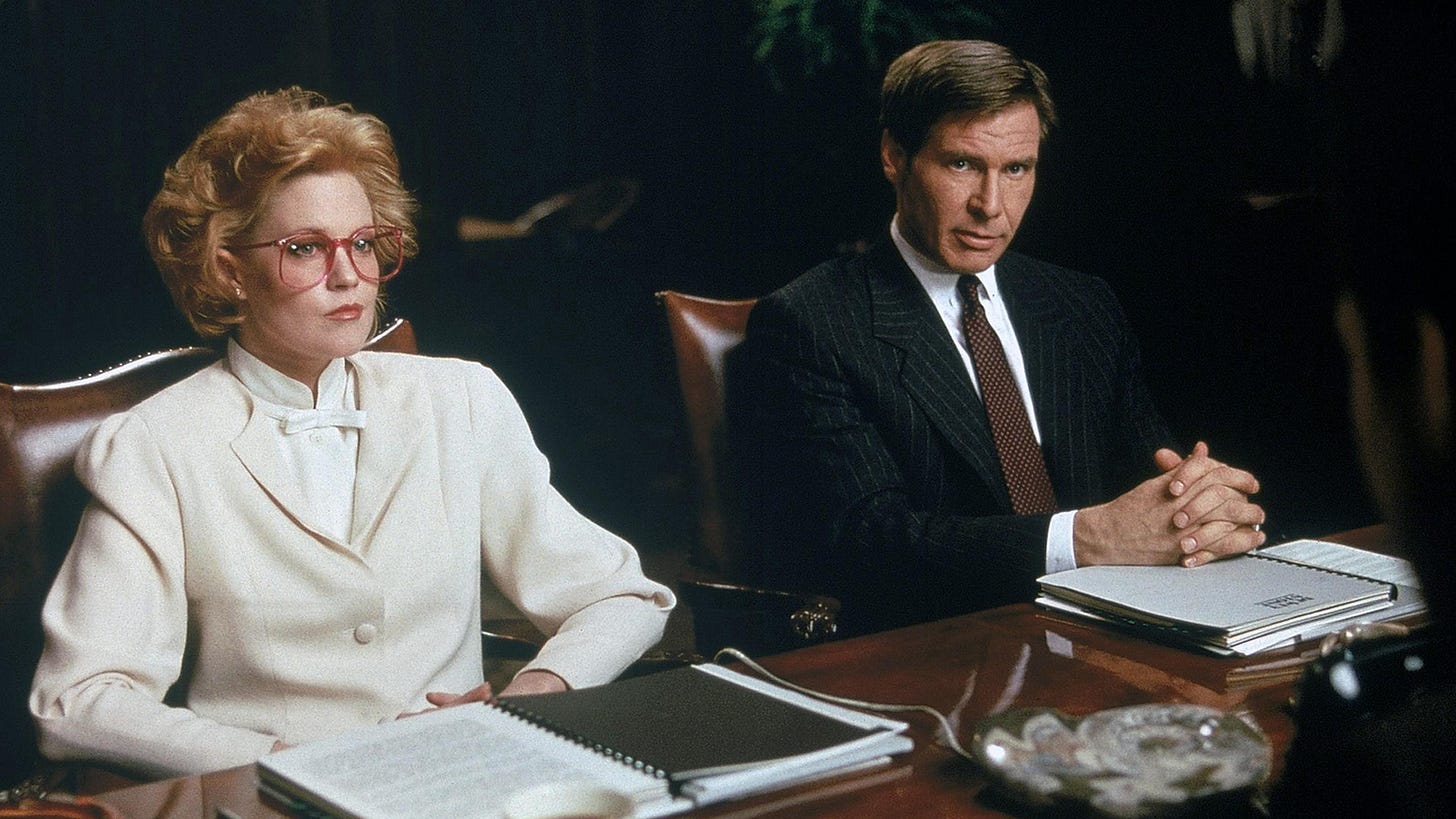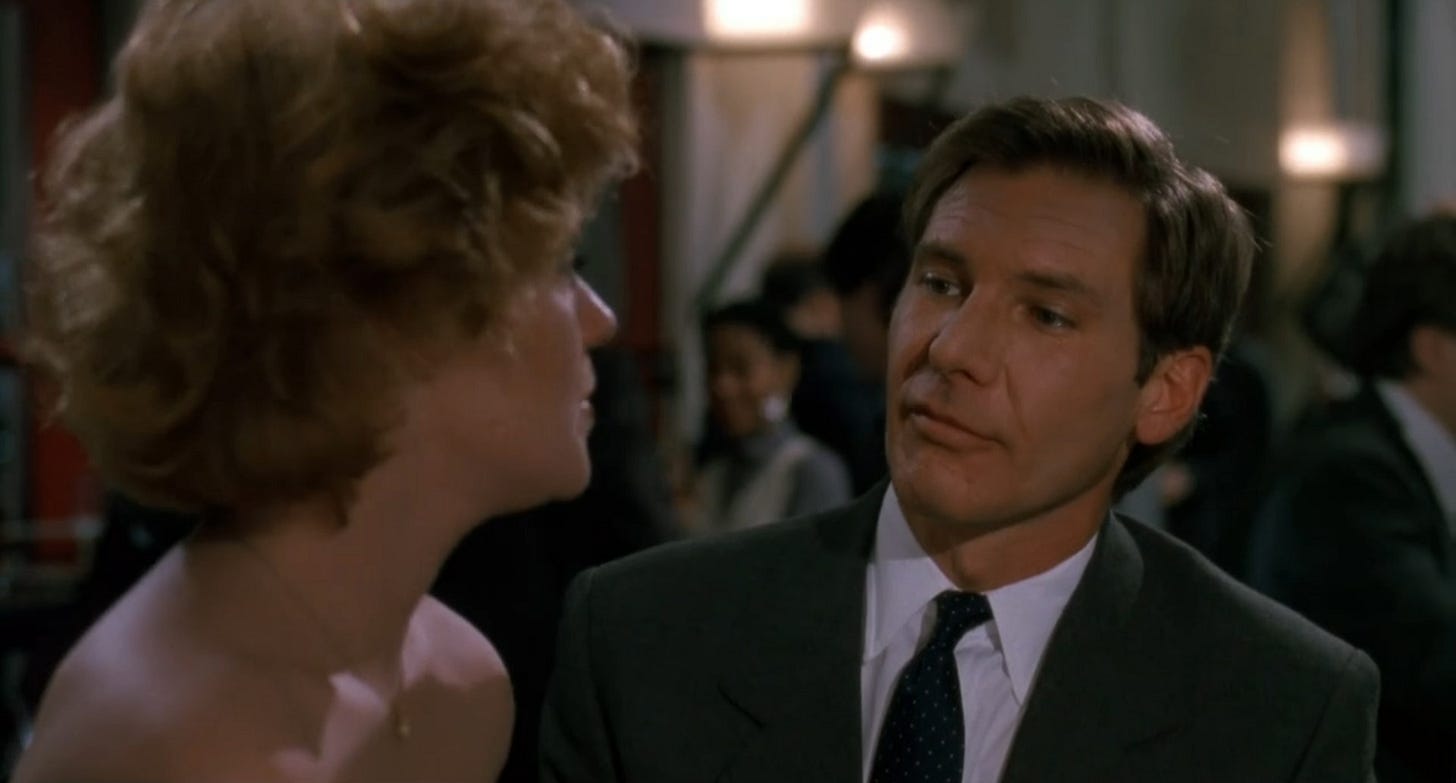'Working Girl Is Harrison Ford At Peak Movie Stardom
How The Actor Used All Of His Tools To Craft A Memorable Character
As many readers know, I love talking about Harrison Ford’s career. I just find him and his two-decade run fascinating, especially his place as probably the biggest name of the blockbuster era (when an actor’s name alone could make a worldwide hit) and his underrated abilities as a character actor who could often play against his persona. And while the roles of Indiana Jones, Han Solo, and Rick Deckard were star-making, they are not the peak of Harrison Ford’s star power. To find the moment when the actor seemed at total ease and command of his persona, you’d have to go to Mike Nichols’ classic romantic comedy Working Girl—a film I recently rewatched after a decade of its scenes living in my memory.
To understand why Ford’s performance as Jack Trainer, a dashing executive in mergers and acquisitions, you have to consider when the film arrived in the actor’s career. See, one must first learn how to be a leading man: In the early going, Ford served in character roles in The Conversation and Apocalypse Now. In between those landmark films arrived Star Wars. The movie certainly served as a breakout, but as one of three stars (and not the main one) Ford was clearly still finding his way. A couple years later, Raiders of the Lost Ark established him as a top of the marquee name. From there, Ford began to play around and stretch his persona: In Peter Weir’s Witness — him at his steamiest — he’s a full on sex symbol; in Mosquito Coast he flips himself to portray a detestable colonialist father; in Roman Polanski’s Frantic he is, not for the last time, suspected of murdering his wife. I’ve previously written about what these works mean in the context of Ford’s career in greater detail for RogerEbert.com in “The Dark Side of Harrison Ford: On the Roles That Led to What Lies Beneath” and “The Film That Changed Harrison Ford's Career: On the 20th Anniversary of K-19: The Widowmaker” — but suffice to say that these early roles saw Ford not only stretching the boundaries of what audiences expected of a Harrison Ford movie, but also what he expected of himself as an actor. So much so that by the time he arrived to Working Girl — released in the same year as Frantic — he poked and prodded himself enough to know how to employ all of his strengths to build the kind nuance a character has that might only exist between the lines on a page.
In the early going of Working Girl, Trainer exists off screen as a potential strategy for Tess McGill (Melanie Griffith). See, when Tess arrives in the mergers and acquisitions department belonging to Katherine Parker (Sigourney Weaver), the Staten Island native, now on her last strike after fighting back against sexism at her previous job, she desperately wants to make a mark so she might have that dream corner office. Tess often combs magazines and newspapers to read the tea leaves for potential ideas: She thinks she’s found one in the form of Trask Industry’s desire to move into television ownership through radio. She goes to Katherine with a plan: The company should approach Trainer to help broker a deal with Trask, thereby allowing themselves to get in on the ground floor. The proposal could work if Katherine herself — in a fashion similar to the men they both despise — weren’t already planning on stealing the idea. Luckily for Tess, Katherine is bedridden after a skiing accident, giving the young assistant access to her boss’ place, wardrobe, and address book. She just needs to meet Trainer, get him on her side by posing as an executive in mergers and acquisitions, and settle the deal before Katherine heals up.
The seeds of Ford’s success as Trainer begins with Nichols’ awareness of how to shoot a movie star. Take our introduction to Trainer: It occurs when Tess crashes a party bedecked in Katherine’s $8000 black velvet dress. The camera cuts to a group of people talking, before pulling back, and rack focusing on Ford’s face. In a single movement, Nichols not only reveals the heartthrob, he establishes the already ingrained expectation that Ford will be a hero, a good man. But he is not good. Trainer is a man, like any other. And in the world of Working Girl — where men ogle and demean, where Tess catches her boyfriend (Alec Baldwin) banging another woman in their bed — this is not a compliment.
Just watch Ford’s face in the scene where Trainer approaches an out of place Tess at the bar: He dons the same kind, inviting visage he employed in Witness. This time, his head cocked to the side, interested, but not really listening. Like a fisherman who thinks he’s got an easy catch, his eyes widen as Tess speaks. Trainer beckons Tess to take one drink, a “shot” of tequila, before tapping his fingers on the bar for another. Before long Trainer is loading a woozy Tess into a cab to his place, and carrying her up the stairs to his apartment. When she awakens in her undergarments the next day, with a naked Trainer lying in bed next to her, we fear the worst. And when she confronts Trainer about the previous night during a business meeting, we’re meant to be assured by Trainer saying that he only stripped her. It’s telling, however, how quickly Trainer follows that assurance with a mean quip about not caring about Tess’ sex life. In another actor’s hands, we’d lose the character. In a lesser script, we’d never return to this conversation.




